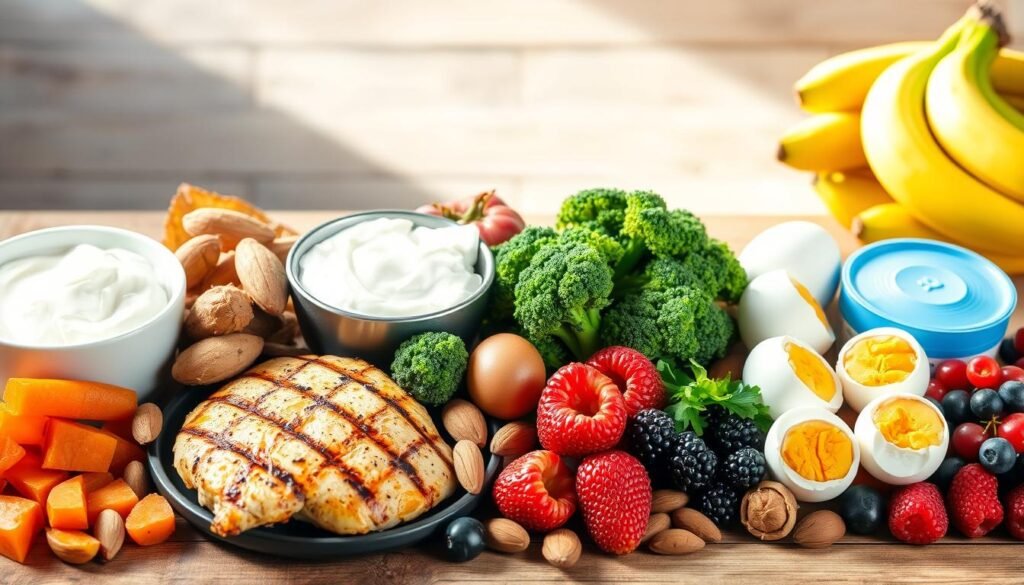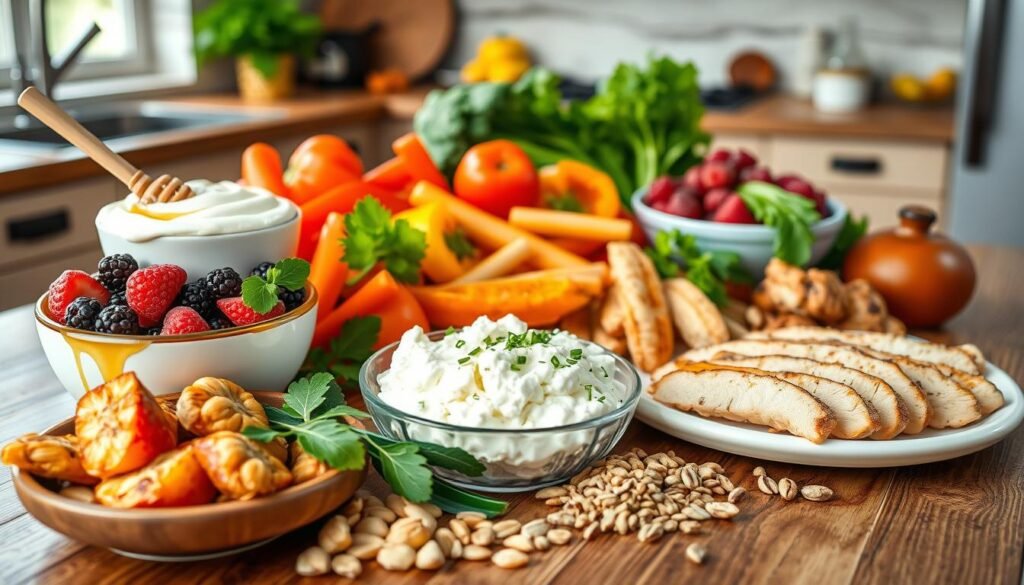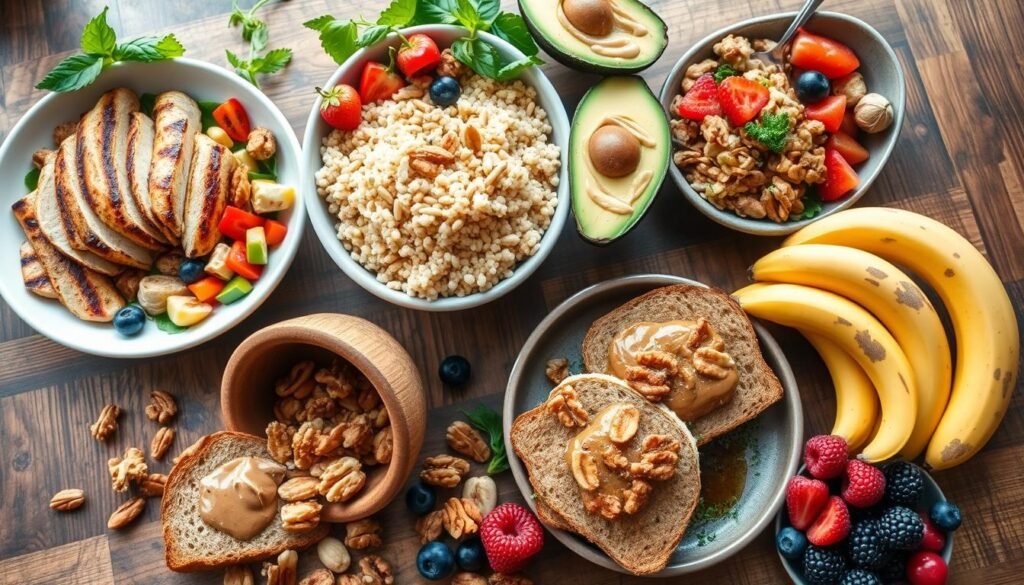The recommended protein intake for building muscle is 1.4 to 2 grams per kilogram of body weight per day. This fact underlines the importance of what we eat during a lean bulking phase. Lean bulking is about more than just eating more; it’s a planned approach to nutrition. It helps maximize muscle growth and keep fat gains low. By choosing the right foods, individuals can improve their workouts and recovery. Making smart eating choices is key for anyone on a fitness journey.
Getting to know the details of a lean bulking diet is crucial for reaching your fitness aims. It’s important to focus on clean, protein-rich foods. These foods support muscle growth effectively. In this article, we’ll explore the top food choices. We aim to ensure every calorie aids in developing lean muscle, not fat.
Key Takeaways
- The recommended protein intake for muscle building is vital, ranging from 1.4–2 grams per kilogram.
- Lean bulking focuses on a caloric surplus of 10–20% above maintenance calories.
- Choosing clean bulking foods primarily from whole, unprocessed sources optimizes nutrient intake.
- Tracking weight gain and caloric intake is essential to preventing stalls in progress.
- High protein bulking foods include options like chicken, salmon, and edamame.
Understanding Lean Bulking
Lean bulking is about gaining muscle without much fat. You eat more calories than you burn. This helps grow muscles. It usually takes 4 to 6 months before you start cutting fat.
Your diet should have a bit more calories than usual, between 10% and 20% more. You should aim to gain about 0.5 to 1 pound each week. Protein is very important, making up 15% to 25% of what you eat. You need about 1.8 to 3 grams of protein per kilogram of your weight every day. The sweet spot is 2.2 grams per kilogram.
Adjusting your diet is key. About half of your calories should come from carbs. They help you do well in your workouts. Fats should be 20% to 35% of your caloric intake. Eating protein at certain times isn’t that important. What matters is meeting your daily protein goal.
Getting dietary advice helps in gaining lean mass. To keep building muscle, you need to gradually increase your workout intensity. If you’re new to lifting, start with 1 gram of protein per pound of your weight. It’s a good base.
| Goal | Caloric Surplus | Weekly Weight Gain | Protein Intake | Carbohydrate Intake | Fat Intake |
|---|---|---|---|---|---|
| Lean Bulking | 10%-20% above maintenance | 0.25-0.5 kg | 1.8-3 g/kg (2.2 g/kg ideal) | 50% of total calories | 20%-35% of total calories |
What is a Lean Bulking Diet?
A lean bulking diet helps the body grow with healthy, balanced food. It needs more calories, about 300 more each day. The focus is on proteins, healthy fats, and good carbs.
For strong muscles, you need a lot of protein, between 1.6 to 2.2 grams per kilogram of your body weight. This is more than what others need. Athletes need even more, about 1.2 to 2.0 grams, for their workouts. Eating protein throughout the day is best, around 0.4 to 0.55 grams per meal.
Carbs are also key, making up 40% of your calories. That’s about 4 to 7 grams per kilogram of body weight every day. Eating often helps with muscle building and keeps your energy up.
Choose foods rich in vitamins, minerals, and good fats for muscle growth. Stick to whole foods over processed ones for better health. Too many processed snacks can make you tired and sick.
Importance of Protein in Lean Bulking
Protein is key for gaining muscle while bulking up. It’s what muscles are mainly made of. To build muscle mass, you need enough protein. This helps muscles grow and recover, improving your workouts. Most athletes eat 1.4 to 2 grams of protein per kilogram of body weight daily.
Lean meats and dairy are great for muscle building. A diet with a good mix of protein, carbs, and fats is ideal for muscle growth. This approach avoids unwanted fat. It’s best to spread your protein intake throughout the day for better muscle synthesis.
Protein sources digest at different rates. Whey protein gets to your muscles quickly, while casein releases slowly. After exercising, 10 to 20 grams of high-quality protein helps with recovery. This can be from dairy or plants.
A protein snack before bed boosts muscle building overnight. Drinking enough water and having carbs and protein before working out improves your performance.
| Protein Source | Protein per Serving | Digestion Rate |
|---|---|---|
| Whey Protein | 20g | Fast |
| Casein Protein | 20g | Slow |
| Chicken Breast | 32g | Moderate |
| Greek Yogurt | 15g | Moderate |
| Tofu | 10g | Moderate |
Eating enough protein and calories is essential for building muscle. Always eat more calories than you burn. But watch where these calories come from. Choosing high-protein foods helps grow muscles without gaining fat. This is crucial for a successful lean bulk.
Best Foods for Muscle Gain
Choosing the right foods is key to muscle gain. They should be rich in nutrients and energy. Good foods for muscle gain help in building and repairing muscles. They include various proteins, whole grains, healthy fats, and fiber.
Chicken and turkey are great for protein, essential for growing muscles. Skinless chicken has around 26 grams of protein per serving. Beef, with more calories, provides about 22 grams of protein. Salmon is good too, offering protein and omega-3 fatty acids for the heart.
Dairy, like Greek yogurt, is excellent for muscle gains, with up to 20 grams of protein per cup. Protein powders, such as ISO Sensation 93, make getting enough protein easy. They are a big part of building muscle.
Foods for muscle growth should have complex carbs like quinoa and brown rice. These fuel your workouts and recovery. Quinoa is full of protein and fiber. Healthy fats from avocados and other sources also help with muscle recovery. They give energy and important nutrients.
To gain muscle, eat more calories than usual, about 15-25% more. If you usually eat 2,000 calories, add 300 to 500 more. You should eat lots of protein, especially if you work out. Aim for 1.4-2.0 g/kg of protein daily to grow muscle.
| Food Item | Protein per Serving | Calories |
|---|---|---|
| Chicken (3 oz) | 26 g | 140 |
| Beef (3 oz) | 22 g | 180 |
| Salmon (3 oz) | 22 g | 175 |
| Greek Yogurt (1 cup) | 20 g | 100 |
| Protein Powder (1 serving) | 25-30 g | 110-130 |
| Quinoa (1 cup cooked) | 8 g | 220 |

Adding these top foods for muscle gain to your everyday diet sets a strong muscle building base. Each item brings not just protein but also key nutrients. These help with energy levels and recovery, supporting fitness goals.
Foods for Lean Bulking
Selecting the right foods is key for those wanting to build muscle but not fat. It’s about eating more calories that are rich in nutrients. We’ll show you the best foods for this, focusing on their protein and benefits for growing muscles.
Eggs as a Muscle-Building Powerhouse
Eggs are top for protein. Each egg has about seven grams of it. They have essential amino acids too, like leucine which helps build muscle. Eating whole eggs after working out can boost muscle protein. This makes them essential for bulking up.
Fish Options: Salmon and Tuna
For lean bulking, don’t forget salmon and tuna. They give you 17 to 20 grams of protein and omega-3s per serving. These help with muscle recovery and your overall health. So, including fish is vital for gaining muscles.
Lean Meats: Chicken and Turkey
Chicken and turkey are perfect for high-protein diets. They provide 26 to 28 grams of protein. These meats are rich in B vitamins too. These vitamins help turn food into energy during workouts. That’s why lean meats are great for muscle growth.
| Food Source | Protein Content (per serving) | Benefits |
|---|---|---|
| Eggs | 7 grams | Rich in leucine and essential vitamins |
| Salmon | 20 grams | High in omega-3 fatty acids and B vitamins |
| Tuna | 17 grams | Supports muscle recovery and low in calories |
| Chicken | 26 grams | Lean source of protein with essential B vitamins |
| Turkey | 28 grams | High protein with low fat content |
Incorporating Dairy: Greek Yogurt and Cottage Cheese
Dairy items like Greek yogurt and low-fat cottage cheese are key for a lean muscle diet. Greek yogurt is rich in protein, with 32 grams per cup. It’s a top choice for adding more protein to your diet. The protein in it breaks down at different speeds, helping build muscle.
Cottage cheese is also great, with about 24 grams of protein per cup. It has casein protein, which takes time to digest. This makes it perfect to eat before bed, aiding in muscle recovery overnight.
Adding these dairy options to your diet isn’t just good for protein. They also provide vitamins and minerals vital for health. To gain muscle, aim for 75 to 150 grams of protein each day. Greek yogurt and cottage cheese can help reach these goals.
Educating consumers about the nutritional benefits of these dairy products can inspire a healthier lifestyle.

| Dairy Product | Protein per Serving | Calories per Serving |
|---|---|---|
| Greek Yogurt (1 cup) | 32g | 485-565 |
| Cottage Cheese (1 cup) | 24g | 206 |
Nutritious Plant-Based Proteins
Adding nutritious plant-based proteins to your diet helps grow muscles and gives you important nutrients. Legumes and soy products are great for those wanting to bulk up healthily.
Benefits of Soy Products
Soy products, like tofu and tempeh, give you all the essential amino acids your muscles need. Tofu has around 20 grams of protein per cup. Tempeh offers more, with 31 grams per cup.
These foods are not only full of protein but are also easy to add to different meals. That makes them perfect for eating in a variety of ways.
Legumes: Beans and Lentils
Legumes are key for healthy bulking. They provide protein, iron, and fiber. One cooked cup of lentils offers about 15 grams of protein. This helps with muscle recovery and growth.
Their high fiber content improves digestion and the body’s ability to use nutrients. Adding beans, peas, and lentils to your diet can help meet your protein needs.
Healthy Fats for Optimal Muscle Recovery
Eating healthy fats is key for muscle recovery and growth when you’re trying to bulk up. These fats give you energy during long workouts. They help make hormones and let your body use nutrients. Foods like avocados, olive oil, nuts, and seeds are loaded with unsaturated fats. These are healthy bulking foods you need.
Healthy fats do more than just give energy. They also help fix your cells after you work out. And they keep your metabolism working right. This means your muscles can recover well and grow. That’s why clean bulking foods are essential for great performance and gaining muscle without fat.
The International Society of Sports Nutrition says you should get at least 15% of your calories from healthy fats. This helps keep your hormone levels steady. Steady hormone levels support muscle growth and overall health. Choosing the right fats makes a big difference in health and how well you perform. For tips on picking good fats for muscle building, read this essential guide.

Complex Carbs: Fuel for Your Workouts
Complex carbs are key for anyone looking to boost their workout performance. They provide quick energy and help with muscle recovery and growth. It’s important to eat a variety of complex carbs for the best results in lean bulking.
Quinoa and Whole Grains
Quinoa is a powerhouse food, full of carbs, protein, and key minerals. It has about 21 grams of carbs per 100 grams, perfect for athletes. Whole grains, such as brown rice and oats, are also great. They give you long-lasting energy for your workouts. For example, brown rice has 76 grams and oats have 67 grams of carbs per 100 grams. This helps keep your energy up during exercise.
Fruits and Vegetables for Nutrient Density
Eating a variety of fruits and veggies is crucial. They offer essential vitamins, minerals, and antioxidants. These nutrients aid recovery and strengthen the immune system, useful during bulking. A medium banana, for instance, has 27 grams of carbs. It’s a great snack before exercising. Including such foods in your diet supports your energy and muscle growth goals.
Creating a Bulking Meal Plan
For those looking to grow muscle mass and boost performance, a well-thought-out bulking meal plan is key. It’s all about finding the right mix of proteins, carbs, and fats. Plus, nailing your meal timing can make all the difference to energy and recovery. This kind of plan is a roadmap for anyone wanting to succeed with a lean muscle diet.
Sample Daily Menu
Your daily eating plan could include protein-packed breakfasts, lunches filled with nutrient-dense lean meats, and dinners focusing on carbs. Let’s take a closer look at what a day could look like:
| Meal | Food Items | Calories |
|---|---|---|
| Breakfast | 4 Scrambled Eggs, 1 Avocado, 1 Slice Whole Wheat Toast | 750 |
| Mid-Morning Snack | Greek Yogurt, 1 Banana, 2 tbsp Honey | 400 |
| Lunch | Grilled Chicken Breast, Quinoa, Steamed Broccoli | 800 |
| Afternoon Snack | Protein Shake, Handful of Almonds | 600 |
| Dinner | Salmon Fillet, Brown Rice, Mixed Vegetables | 850 |
| Evening Snack | Cottage Cheese, Blueberries, Peanut Butter | 300 |
| Total | Daily Intake | 3,700 |
Meal Timing Strategies
To get the most out of your bulking phase, timing your meals is crucial. Here are a few strategies:
- Pre-Workout Meals: Eat carbs and protein 1-2 hours before your workout to keep your energy up.
- Post-Workout Nutrition: Right after you exercise, focus on protein and carbs to help your muscles recover and refill your energy stores.
- Frequent Meals: Having smaller meals more often during the day can keep your energy steady and support your calorie needs.
Conclusion
To effectively gain muscle with minimal fat, balance your diet and exercise. Aim for a caloric surplus of 200–300 calories more than what you need to maintain your weight. This helps in muscle building. For example, someone who weighs 160 pounds should eat between 2,600 and 2,700 calories daily. Focus on eating foods high in protein, complex carbs, and healthy fats for better muscle growth.
Creating a meal plan is key. Aim for 195 grams of protein, 300 grams of carbs, and 100 grams of fats daily for muscle growth. Choose healthy foods like chicken, lean meats, fish, eggs, and whole grains. Also, eating various fruits and veggies provides vitamins and aids in recovery. These are important for gaining muscle efficiently.
Training 4 to 5 days a week will help you reach your fitness goals. Work on different muscle groups each time. Keep track of your weight and adjust your calories to steadily gain 0.5–1 pound a week. This makes sure your muscle gain is mostly lean. For more tips on meal planning and muscle building without gaining fat, check out lean bulk essentials. Also, visit balanced meal planning for the best foods to help with muscle gain.